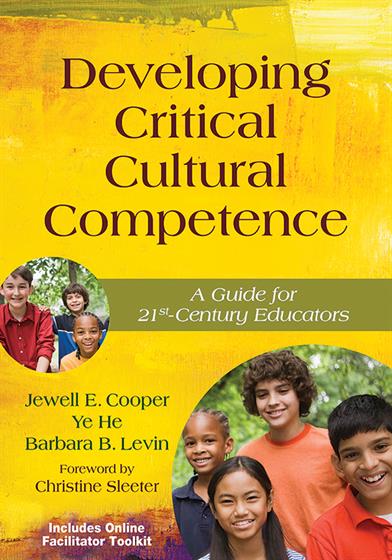List of Resources
Foreword by Christine Sleeter
Preface
Why do we need this book?
What is critical cultural competence?
Who is this book for?
How is this book different from other books about diversity and multicultural education?
Organization and Special Features of This Book
Conclusion
Acknowledgments
About the Authors
Introduction: What Do We Need to Do to Prepare Teachers for Today's Diverse Classrooms?
Why do we need educators with critical cultural competence in today's schools?
How can we move professional development about diversity beyond knowledge?
Who are we in this thing called diversity?
How do we leverage assets of students, families and communities?
Bringing It All Together
Summary of Key Points
Reflection and Extension
1. Common Practices: How Are We Currently Preparing Educators for Diverse Classrooms?
Introduction
Common Goals for Multicultural Education
Foundational Understandings About Diversity
Milner's Five Conceptual Repertoires of Diversity
Empathy Versus Sympathy
Strength-Based Approach
Materials and Resources
Textbooks
Historic and Contemporary Videos
Online Learning Resources
Guest Speakers
Other Commonly Used Activities and Approaches
Discussions and Reflection
Case Studies and Case Discussions
Book Clubs
Activity 1.1 Book Club Jigsaw Activity
The Game of Monopoly
Empathy Activities
Summary of Key Points
Reflection and Extension
Online Extensions
2. Who I Am: How Can We Understand Ourselves as Cultural Beings?
Introduction
Exploring Personal Characteristics and Beliefs
Activity 2.1 Autobiographies
Activity 2.2 Educational Philosophy
Activity 2.3 All About Me Activities
Activity 2.4 All in a Picture and Snapshot of Me Activities
Revealing Beliefs and Identities to Others
Activity 2.5 Intercultural Autograph Hunt
Activity 2.6 Bio-Poems
Activity 2.7 the Privilege Walk
Summary of Key Points
Reflection and Extension
Additional Resources
Online Extensions
Focus for Professional Learning Communities (PLCs)
3. Moving From Beliefs and Visions to Action: How Can We Link Our Personal and Professional Identities?
Introduction
Activity 3.1 Visioning
Activity 3.2 Personal Practical Theories (PPTs)
Activity 3.3 Action Research
Summary of Key Points
Reflection and Extension
Additional Resources
Online Extensions
Focus for Professional Learning Communities (PLCs)
4. How Do We Prepare Educators to Understand and Appreciate Student Diversity?
Introduction
From Understanding Diversity to Appreciating Diversity
Activity 4.1 Diversity Fact Sheets
Activity 4.2 Website Reviews
Activity 4.3 Interactive Survey
Activity 4.4 Description, Interpretation, and Evaluation
Summary of Key Points
Reflection and Extension
Online Extensions
Focus for Professional Learning Communities (PLCs)
5. From Critical Awareness to Transformative Action: How Do We Prepare Educators to Become Cultural Brokers for Student Success?
Introduction
From Critical Awareness to Transformative Action
Cross-Cultural Competence and Critical Self-Reflection
Activity 5.1 Active Listening
Activity 5.2 Classroom Observation Analysis
Activity 5.3 ABCs Project
Summary of Key Points
Reflection and Extension
Online Extensions
Focus for Professional Learning Communities (PLCs)
6. Learning About the Community: How Can We Learn More About Parents and Families?
Introduction
Standards-Based Reform
Benefits of Invoving Parents and Families in Schools
Traditional Ways of Involving Parents in Schools
Nontraditional Approaches to Parents and Involvement
Barriers and Facilitators to Involvement
Extending Traditional Approaches to Parent and Family Involvement
Activity 6.1 Touring the Neighborhood--The Do's and Don'ts
Activity 6.2 Home Visits at the Beginning of the School Year
Activity 6.3 Preparing for the First Parent Conference
Summary of Key Points
Reflection and Extension
Online Extensions
Focus for Professional Learning Communities (PLCs)
7. Community-Based Learning: How Can We Learn From Parents, Families, and Communities?
Introduction
How diverse are families and our communities?
Partnering with Parents, Families, and Communities
What is community-based learning?
Community-Based Learning Activities
Activity 7.1 Home-Community Camera Adventure
Activity 7.2 Walking a Mile in Another's Shoes
Transformative Effects of Community Adventures
Summary of Key Points
Reflection and Extension
Online Extensions
Focus for Professional Learning Communities (PLCs)
8. Bringing It All Together: How Do We Maximize Teaching and Learning Opportunities?
Introduction
Connecting Culturally Responsive Pedagogy and Critical Cultural Competence
Taking Risks to Develop Critical Cultural Competence
Inspiring Critical Reflection and Awareness
Transforming Professional Practice
Using Rogers's Adoption of Innovation Theory
Using the Concerns-Based Adoption Model (CBAM)
Planning for Professional Development
Before We Start
Pre- and Postassessment
Follow-Up
Summary of Key Points
Final Words
Additional Resources
Reflection and Extension
Online Extensions
References
Index




